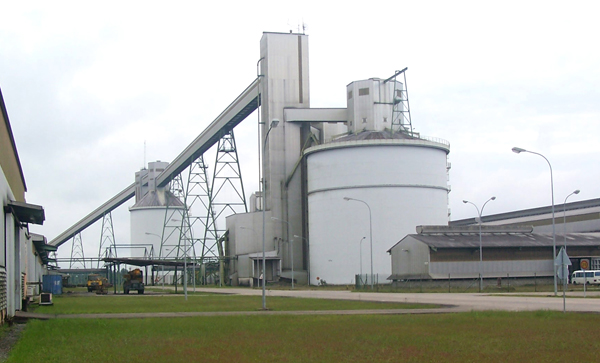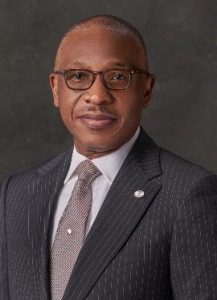Business
ALSCON: Nigeria’s case of self-inflicted economic sabotage?

By Yemie ADEOYE
“I am the greatest obstacle to my greatest dreams.”
–Craig D. Lounsbrough
LAGOS-THE Aluminium Smelter Company of Nigeria, popularly called ALSCON, is Unarguably one of the largest Aluminium smeltering company ever to be sited on the continent of Africa, and also unarguably one of the most strategically located on the planet.
With the proximity of this plant to neighboring African countries around the Gulf of Guinea like Ghana, Togo, Benin, Cameroon, Equatorial Guinea, Gabon, Sao Tome, it can be easily seen that this plant would be an economic booster to Nigeria.
Nigeria’s financial loss to the controversy
The plant was designed to produce 193,000 tons of Aluminium annually at optimal capacity. As at 1997, a ton of Aluminium was sold at 3000USD. What this means is that at full capacity ALSCON was designed to generate approximately 600 million USD annually.
However with the current market price of about US$2,108 per metric ton according to Statista, the plant will be generating a minimum of US$406,844,000 per year, and with a good well structured and business inclined management, the company is capable of generating about a billion dollars annually in the very near future. Sadly, since this bid happened 16 years ago, Nigeria has not generated a dime from ALSCON, thereby defeating the sole essence of the bid process.
The controversy that has surrounded and grounded the activities of this huge economic infrastructure is preposterous, unimaginable for an economy begging for investments and could at best be described as a self-inflicted economic sabotage.
Nigeria goes cap in hand to china, IMF, world Bank, Paris Club and any other institution or country that has capacity to spare a loan, while it continues to systemically and installmentally destroy its money-generating infrastructures. How can this ever be rationalized?
A brief history of the controversy
- In 2004, the Bureau of Public enterprise, BPE called for bids from interested investors willing to purchase the Aluminum Smelter Company of Nigeria, ALSCON in Ikot-Abasi, Akwa-Ibom state, south-south Nigeria.
- The American BFI Group led by a Nigerian-American professional, Dr. Reuben Jaja also came down to Nigeria to Bid for the aluminum smelting plant and emerged the winner, after putting up a bid of $410 million.
- Surprisingly and under controversial circumstances, the BFIG, which was declared winner was not handed the needed documents by Government in order to proceed to the payment stage, and the Russian company, UC Rusal which came second during the bid with a far lesser bid of about $250 million was handed the share purchased agreement, SPA, with all the agreed annexures which would make the plant a successful investment. This allegedly happened under seemingly shady and very controversial circumstances.
- The BFIG immediately went to court to seek redress. The Group lost at the high court and moved to the appeals court, it again lost the case and moved to the Supreme Court where it finally got judgment in its favour in 2012. The judgment was unanimous by all five justices of the apex court.
- Since receiving the Supreme Court judgment in 2012, the BPE has refused to honour the judgment of the court, and in the last eight years since the judgment, the BFIG has gone back to court severally to enforce the Supreme Court judgment, which is in its favour. This culminated in the federal court judgment of December 17, 2019 instructing the BPE to comply with the judgment of the Supreme Court and hand over the SPA to the BFI Group according to the Supreme Court judgment of 2012. The federal high court went further to order the remand of the Director General of the BPE in prison custody for 30 days as a deterrent and for his failure to honour the Supreme Court judgment.
NASS
In 2005, the senate committee on commercialization and privatization issued an order rebuking the presidency for revoking the bid and selling to the Russians at a reduced price, and described the conduct of the presidency as “fraud and corruption against the nation”
The House of Representatives issued another order in 2015 demanding that the Share Purchase Agreement, SPA, which is the bone of contention, should be handed over to the BFIG with all the 17 annexures included in it. In all the BFIG says it has four orders of the national assembly in its favour and saying almost the same thing, why isn’t anyone listening for sixteen years?
Sixteen years of litigation has gone by between the Bureau of Public Enterprise, BPE, and the preferred winner of the bid, the BFI Group, with all the courts of the land, including the Supreme Court sticking to one narrative, which is that the BPE should hand over all relevant and necessary documents to the BFIG, which must include the annexures in order for the group to effect the 10 percent payment according to the laws.
Now, how difficult could it be to obey the rule of law, which governs every normal society? This writer has sighted several documents including court judgments, which alludes to the fact that there is a duly orchestrated strategy to undermine the judiciary of this country and bring it to ridicule before every prospective investors around the world, thereby undermining the national economy of this great nation.
Nigeria’s current reality
Currently, Nigeria is ranking in the negative on all developmental indices. With over 10 million out of school children scattered all over the country. Also ranking as the “poverty capital of the world, it is said that if the country is unable to change its current trajectory, it will be home to 110 million people living in extreme poverty by the year 2030, as against the 90 million people currently in that state of life.
How can a country with such liability amidst infrastructure deficits afford to treat foreign investors who are here to help lift its economy with such disdain and wickedness? What message does this protracted anomaly send to the international community, investor nations and organizations and even to us as a nation?
Now the plant, which was at 30 percent production capacity, is currently down to a paltry 5 percent. The staff strength, which was over 800 about 15 years ago, is now abysmally down to less than 30 people. A company that was valued at about US$1.5 billion has been devalued to around US$100 million dollars according to the KPMG audited financial reports.
The BFI Group
This group is not just an American group with interest in treating a Nigerian infrastructure as the Russians currently do, but a Nigerian professional leads it with deep roots to this country, as the great grandson of the famous king Jaja of Opobo Kingdom in present day Rivers state and with very towering global attainments, especially in the United States of America where he worked with several organizations including the United States federal reserve Bank. e was a lead banking law enforcement participant on various delegations including the U.S. Financial Institution Experts delegation to the Republics of Russia and Hungary.
The gentleman is an asset to Nigeria if only we can recognize one when we see it, and his biggest problem is probably his inability to transact business in the Nigerian. When asked he has said severally that the Group is guided by the foreign corrupt Practices Act of the United States.
After seeing several interviews granted by the president of the BFI group, Dr. Reuben Jaja, including the one he had on the Energie Platform radio show, it does not only leaves much to be desired, but makes it very difficult to decipher how we intentionally shoot ourselves in the foot by making very simple issues become so knotty and difficult.
There is a Supreme Court Judgment issued and written in English. The judgment was very clear, and one wonders how such a judgment can be so flagrantly disregarded by an agency of government without any form of reprimand or call to order? Either by the presidency or the Attorney General of the federation, especially as the agency in question, the BPE, is under the presidency. This sad development can only tarnish the country’s image before the international community and prospective investor nations and organizations if allowed to continue unchecked.
The President of the BFIG made it clear on national television with documents to show, that he and his group have always been ready and willing to pay for this plant as stipulated by law, all they seek from the BPE is the sixteen page share purchase agreement, SPA with the 17 annexures inclusive as directed by the courts, and the moment this duly signed document is handed to the group, they will proceed to comply with the stipulated 2 weeks for payment.
According to him, since the take over of the Plant by the Russian UC Russal, they have continued to strip off the valued assets of the plant and have been intercepted on occasions by the Nigerian Army, which handed over the accosted four trucks to the Nigerian police, all filled with valued assets of the plants.
It is worthy of note that this exact scenario played out in Ajaokuta steel plant when the Indian company, GINL was in charge of the plant. It is on record that the villagers accosted the officials of the company while attempting to cart away assets of the steel plant.
Unanswered Questions
The questions now begging for answers are: what is the offence of the BFIG after it paid the requisite US$1 million expression of interest fee and went ahead to win the bid?
Why is it so difficult to hand over the requested documents even after the pronouncement of the Supreme Court of Nigeria, which is final on all litigations and cannot be appealed?
Could this be the case in a true democracy and in an egalitarian society?
Who is afraid of the BFIG? What does this say about our integrity as a nation?
If the BPE is right and justified in this case, why will the federal High court Abuja commit the Director General of the BPE, Mr. Alex Okoh to a 30-days jail sentence in December of 2019 for failing to comply with the supreme court judgment?
What is the supposed role of the National Assembly in this case of gross economic sabotage on the nation?
What is the role of the presidency, the Inspector General of police, and the Attorney General of the federation and minister of justice under whose watch a unanimous judgment of the Supreme Court is being so flagrantly disobeyed and disregarded by an agency of government?
Nigeria’s past experiences with notable investors
This attitude to foreign investors, especially the ones we invite into our country for economic reasons must stop for image sake, and for the sake of all we hold dear as a nation.
Since the return to civil rule about 20 years ago, Nigeria has had some very sad, but notable experiences with foreign investors, which has not been helpful to our image as a nation.
First it was Sir Richard Branson and the Virgin group, which entered into a partnership with the country to form the Virgin Nigeria Airline, his views about Nigeria after the crash of this partnership is quite sad and a very terrible blow to the Nigerian brand.
We also recall the Ajaokuta steel plant controversy. A major economic booster for Nigeria, which was allowed to rot away even at 98 percent completion. We gave it to the Indian company, GINL, but of course, it also landed in the courts for litigation, even as the federal government seems to be at the receiving end, begging for renegotiations and out of court settlement, as the state of the plant remains moribund!
Very recently, the case of P&ID emerged and has continued to embarrass Nigeria internationally as that supposed economically viable partnership has also gone up in flames and gone from arbitration to litigation in far away United Kingdom.
Now, we have the BFIG in our courts for sixteen whole years. That is a lifetime! It is enough time to revamp and rebuild the entire infrastructure of Nigeria. What sort of nation are we building? Can we really lay claim to a civil society if court orders are shabbily treated with this sort of flagrant disregard even for a judgment of the highest court of the land?
I seize this opportunity and moment to call on Mr. President, the National Assembly and the inspector General of Police, The Attorney General and minister of Justice to grant this issue the attention that it deserves and require. It is a case of monumental national importance, as the image and integrity of our nation is on the line.
Business
Nothing Is Impossible, Dangote To Harvard Scholars

Young entrepreneurs and scholars have been urged to rise above limitations and push their ambitions to help transform the world into a better place.
The President/Chief Executive, Dangote Industries Limited, Aliko Dangote, gave the charge in Lagos last Wednesday when a delegation of Harvard Kennedy School scholars visited the Dangote Petroleum Refinery & Petrochemicals complex and Dangote Fertiliser Limited in Ibeju Lekki, Lagos.
Addressing the 50 scholars, representing 18 different nationalities from across the globe, Dangote emphasised the importance of being driven by ambition and a ‘can-do’ spirit, as exemplified by the Dangote Group in constructing the world’s largest single-train refinery.
He stressed that ambition should be paired with a desire to create a legacy and make an impact, not simply for profit.
ALSO READ: Okpebholo Stands With Tinubu On Rivers State
“Life is not worth living without ambition. In this life, nothing is impossible. Don’t allow fear to hold you back. Be knowledgeable about the business you want to pursue. I am not an engineer, but I don’t engage in any business I don’t understand,” he said.
Dangote, who spent over 40 minutes answering questions from the scholars, recalled being advised against building the refinery, as many argued that such mega projects were only feasible for sovereign nations, not individuals.
He shared that, during the COVID-19 pandemic, the company had to find ways to sustain the project.
He also noted that the ingenuity involved in constructing a world-class refinery, which meets global best practices, produces Euro V products, and is capable of processing over 100 different types of crude oil, has kept it running despite shortage of Nigerian crude oil.
Vice President, Oil & Gas, Dangote Group, Edwin Devakumar, explained that building the 650,000-barrel-per-day refinery was a monumental feat that required immense courage, vision, and determination.
He pointed out that the group acted as its own Engineering, Procurement, and Construction (EPC) contractor for the project – a refinery with a capacity of 650,000 barrels per day – a feat that had never been attempted before.
“Our Group President has a plaque in his office that reads, ‘nothing is impossible.’ This is the mindset he instilled in us when faced with challenges. He does not accept impossibilities and always aims for excellence. This approach was the same when we revolutionised the cement industry in Nigeria. We turned the country from one of the largest importers of cement into a net exporter. Today, after decades of depending on imported refined products, we now have the capacity to meet all of Nigeria’s refined product demands, with surplus supplies of jet A1, gasoline, and diesel for export. Other products from the refinery include polypropylene, carbon black feedstock, and sulphur,” he said.
Devakumar highlighted the significant investments made to realise the project, including dredging 65 million cubic metres of sand to raise the height of the site by 1.5 metres to safeguard against potential sea level rises due to global warming. The group also procured 330 cranes and lifting equipment due to the lack of local capacity, built the world’s largest granite quarry to supply materials such as coarse aggregates, stone columns, and stone dust, and constructed the refinery on 250,000 piles – potentially the largest number ever used for a single project.
The scholars, who toured the magnificent complexes, were in awe and praised Dangote for his ambitious vision, which seeks to address global needs. They commended him as an inspiration and entrepreneurial genius, with many describing the visit to the refinery as the highlight of their tour, which also included stops in Ghana and Abuja.
Sheffy Kolade, leader of the Harvard Kennedy School student-led Nigeria-Ghana Trek and a global advisor for the Women for Prosperity project with the Atlantic Council’s Freedom and Prosperity Center, said that the Dangote Group symbolises Nigeria’s resilience and economic transformation.
“I want to start by saying that the Dangote Group is not just a business. It is a symbol of Nigeria’s resilience. It is a symbol of the bright future that lies ahead for us. It represents the extraordinary achievements possible when we put our minds to something. I am happy that we are here to witness the economic progress happening in Nigeria. We’ve seen the largest single-train refinery in the world, and we’ve visited a fertiliser plant that exports to South America and the US,” she said.
A social entrepreneur and a member of the Forbes Business Council, Kolade added, “From where we are standing, thousands of people earn their daily livelihood. This business has created numerous jobs and energy security for our country. It has reduced our reliance on imported petroleum products, and, of course, it is increasing our foreign reserves. I want to thank you, sir, for everything you’re doing for our country and for Africa. We appreciate it. It’s truly inspiring for us.”
On her team and their mission at the refinery, Kolade noted, “My team consists of 50 people from 18 different nationalities. We have people from nearly every continent. We are a blend of policy, business, sustainability, and development-minded individuals, most of whom are from the Harvard Kennedy School. There’s one from the Harvard Business School, one from Harvard Public Health, and others pursuing joint degrees with Harvard, Stanford, and MIT. We are all curious-minded people who value impact, sustainability, and progress.”
Another member of the team, Darrow Merton, a Foreign Service Officer with the United States, described Dangote’s vision and resilience as an inspiration to entrepreneurs. He praised Dangote for not only breaking barriers to build the refinery but also for his ability to provide innovative solutions in the face of adversity.
Business
Global Money Week: NGX, CBN, MinieMoney Preach Financial Literacy To Students

As part of activities in commemoration of the 2025 Global Money Week, the Nigerian Exchange Group (NGX Group) collaborated with the Central Bank of Nigeria (CBN) and MinieMoney to empower over 200 students with essential financial literacy skills.
Biztellers reports that the initiative underscores a shared commitment to fostering financial inclusion and equipping young Nigerians with the knowledge required for long-term financial well-being.
The event convened students from leading schools, including Vivian Fowler Memorial College for Girls, Dansol High School, Kith and Kin Educational Schools, Caleb British International School, Lagos Preparatory and Secondary School, and The Bells Comprehensive Secondary School.
ALSO READ: Tinubu Swears In Ibas As Rivers Sole Administrator
The participants engaged in insightful discussions on financial literacy, investment strategies, and capital market operations, with the added opportunity to experience firsthand the dynamics of the NGX trading floor.
Now in its 13th edition, Global Money Week is a global initiative designed to promote financial education among young people, ensuring they develop the critical thinking skills needed to make informed financial decisions. The 2025 theme, “Think Before You Follow, Wise Money Tomorrow,” reinforces the importance of strategic financial planning from an early age.
At the event, Head of Trading and Products at NGX, Abimbola Babalola, highlighted the transformative power of financial literacy in shaping students’ futures.
“The financial choices you make today will determine the quality of your life tomorrow. Understanding saving, investing, and responsible money management early on will put you on the path to financial success,” he stated.
On his part, Assistant Director of the Consumer Protection Department at CBN, Christian Mordi, introduced the CBN’s ‘Sabi Money’ platform, designed to enhance financial education nationwide.
“Financial literacy extends beyond numbers; it is about developing discipline, patience, and informed decision-making skills that foster economic security,” he noted.
Similarly, the CEO, MinieMoney, Gbolahan Faniran, emphasized the importance of early investment habits and leveraging the power of compound interest. “Achieving financial success is not about following trends but about making intentional money choices today that ensure a secure future,” he said.
Beyond this event, the NGX Group continues to champion financial literacy through strategic initiatives, including its X-Academy, which provides tailored financial education programs, and the NGX StockTown, a comic book series designed to educate young people through engaging storytelling.
Through partnerships like these, NGX Group remain steadfast in its commitment to raising a generation of financially literate and empowered individuals. By equipping students with essential financial knowledge today, the initiative lays the foundation for informed decision-making and long-term wealth creation, ensuring a more financially inclusive future.
Business
JUST IN: Dangote Refinery Suspends Fuel Sales In Naira

The Dangote Petroleum Refinery has announced a temporary suspension of petroleum product sales in Naira, citing a misalignment between its sales proceeds and crude oil purchase obligations, which are currently denominated in U.S. dollars.
In a statement issued on Wednesday, the refinery explained that its sales in Naira had exceeded the value of Naira-denominated crude it had received.
As a result, the company said it was necessary to adjust its sales currency to align with its crude procurement requirements.
The refinery also addressed online reports alleging that loading activities had been halted due to ticketing fraud.
Dismissing the claims as “malicious falsehoods,” Dangote Refinery assured stakeholders that its systems remain robust and that no fraudulent activities had occurred.
The statement reads, “We wish to inform you that, Dangote Petroleum Refinery has temporarily halted the sale of petroleum products in Naira. This decision is necessary to avoid a mismatch between our sales proceeds and our crude oil purchase obligations, which are currently denominated in U.S. dollars.
“To date, our sales of petroleum products in Naira have exceeded the value of Naira-denominated crude we have received. As a result, we must temporarily adjust our sales currency to align with our crude procurement currency.
“Our attention has also been drawn to reports on the internet claiming that we are stopping loading due to an incident of ticketing fraud. This is malicious falsehood. Our systems are robust and we have had no fraud issues.
“We remain committed to serving the Nigerian market efficiently and sustainably. As soon as we receive an allocation of Naira-denominated crude cargoes from NNPC, we will promptly resume petroleum product sales in Naira.
It added “We appreciate your understanding and cooperation during this period”.
















